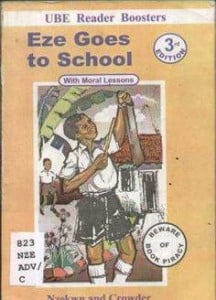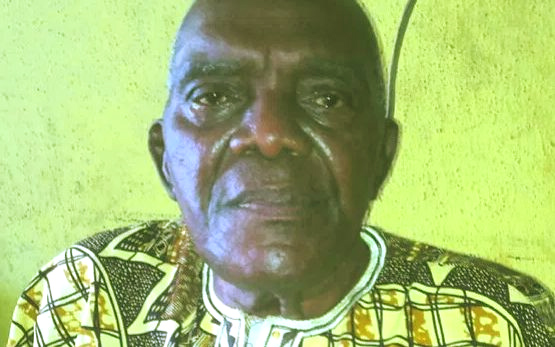In 1966, Odinigwe Joseph Onuora Nzekwu co-authored Eze Goes To School — a children’s book that would etch his footprint eternally in gold. So successful was the book that when he died on Friday at the age of 89, you needed to add “author of Eze Goes to School” to get a nod of “I know him” from many people.
Yet this was a man that, in retirement, confessed to not always having money to buy books — even though he wished he could.
But Eze Goes to School has inspired so many newspaper headlines. A serialised comedy featuring Nkem Owoh and Funke Akindele is also titled Eze Goes to School.
Such is the lasting influence of the teacher, writer and editor who died in his home in Onitsha, Anambra state, where he had been living after retiring from active service to his country.
Advertisement
Born February 19, 1928, in Kafanchan, Kaduna state, Nzekwu was a writer who was known for exploring the internal conflicts between the educated Igbo and the traditional Igbo culture in his works.
Nzekwu taught for nine years after he obtained a teachers’ higher education certificate in 1946 and later went on to be pioneer general manager of the News Agency of Nigeria (NAN).
‘EZE GOES TO SCHOOL’
A reviewer wrote the following comment on the book, whose co-author was Michael Crowder.
Advertisement
This book, written and published decades ago by a revered Nigerian academic, was a bestseller and a must-read for children for many years. Whilst the western world can boast thousands of important works published for children, the same is not the case in Africa. Or even general works. The author of Eze goes to School, Mr Nzekwu might even seem like an unlikely “candidate” to have written such a fine work for kids, as he is a superb author of adult novels; some pundits even claim that in some ways he was “better” than Chinua Achebe as a novelist.
Those who might find this incredulous would do well to read Nzekwu’s novels like Wand of Noble Wood, and Blade among the Boys. Interestingly, Achebe said he was not happy with the way Eurocentric writers portrayed Africa and its denizens hence he decided to write his own novel(s); and Nzekwu has also pointed out that he wrote this famous book for children when he found out that there were no such books written for kids by Nigerians who knew the society well. And hence this legendary work was conceived and born.
For decades thousands and thousands of children in west Africa would identify with the protagonist, Eze and his travails whilst trying to garner the rudiments of western education. There are many difficulties in his path, and heart-breaking tragedy too, especially when he loses his father! The angst here lives on in the mind of many readers. But our Eze is not a quitter and plods on, ever resilient… and somewhat succeeds. The importance of education is highlighted in this book, which essentially is a long-standing triumph.
‘WHY I WROTE EZE GOES TO SCHOOL’
In an interview with PMNews in 2012, Nzekwu said he wrote the book to tell and African story to African children.
Advertisement
He said: “The reason for Eze Goes to School was because a few books had been written for Nigerians by Nigerian writers. But there was nothing about Nigerian children or for them to read. All the books that we had, when I was in school and when I came out, were books about European children.
“So I thought I should write something about our own children and how they live. And I wrote it based on our surroundings so that the child who is reading it will understand and appreciate that this is something that is familiar.”
‘THEY WANTED TO DOCTOR MY WAR STORY’
Nzekwu wrote both fictional and non-fictional works — and kept publishing in old age. Troubled Dust, his fictionalized account of the Nigerian civil war, made the long list of the Nigeria Prize for Literature after it was released in 2012.
Born in Kafanchan, Kaduna State, Nzekwu had a part of his elementary education there. He lost his father when he was in Standard Three and relocated to the Eastern part of the country.
Advertisement
Asked by PMNews why he was coming out with the book 42 years after the war, he said it was not his making.
“The question is not why I wrote it now. It should be why is it being published now? I have been working on the book since the civil war ended. But one of the problems that I met is the question of getting a publisher who will accept it the way it is. I didn’t write the book now. I published it when I got a publisher who took it the way it is and did a good job for me and for himself,” he said.
Advertisement
OTHER NOTABLE WORKS
Nzekwu was famous for Eze Goes to School, published published by African University Press, but he was also known for his works such as The Chima Dynasty in Onitsha and Faith of Our Fathers.
The writer also has to his credit, a compendium of the arts, beliefs, social institutions and code of values that characterised the Onitsha traditional community which was published in 2003.
Advertisement
He is also known with the works “Highlife for Lizards” and “Wand of Noble Wood”.
The Encyclopedia Britannica said his first work “Wand of Noble Wood” published in 1961 “portrays in moving terms the futility of a Western pragmatic approach to the problems created by an African’s traditional religious beliefs”.
Advertisement
HUMBLE LIFE LIFESTYLE
Nzekwu was said to have lived a simple and humble life. He once was once quoted to have said that he did not read a lot of Nigerian writers because he did not have money to buy the books sometimes.
In an interview with NAN, he had advised young writers to read saying “the fact of the matter is that Nigerians don’t read, they don’t read as much as one would have wanted them to read”.
In June 1960, Nzekwu married Onoenyi Justina Ogbenyeanu, daughter of Isaac Aniegboka Mbanefo, Odu II of Onitsha.
In January 1956, he started his career in the federal civil service as an editorial assistant at the then Nigeria Magazine Division which was in the ministry of information.
Within two years, Nzekwu rose to the position of editor-in-chief of the magazine in 1985.
In 1966, the writer was forced to transfer his service to then eastern Nigeria public service, where he was a senior information officer.
And in 1968, he was promoted to the position of deputy director of a newly created cultural division.
At the end of the 30-month civil war in 1970, Nzekwu returned to the ministry of information as senior information officer.
On July 1, 1979, the writer was later confirmed as substantive general manager of NAN.
‘MAKER OF NAN’ AND OTHER AWARDS
In 1991, he was inducted into the ancient and prestigious Agbalanze Society of Onitsha.
On August 8, 2006, Nzekwu received a plaque with the engraving “Maker of NAN”. The recognition was given to him when the news agency marked its 30th anniversary.
In December, 2008, Nzekwu was conferred with the Nigerian national honour of the officer of the order of the Niger (OON).
Earlier in 1961, Nzekwu received the Rockefeller foundation fellowship and also in 1964, he was awarded an UNESCO fellowship which allowed him to study copyright administration in six cities across Europe and America.
Add a comment







